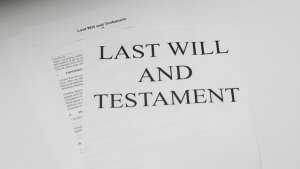Understanding Testamentary Capacity

Contact
Table of Contents
What is testamentary capacity?
Testamentary capacity refers to a person’s legal and mental ability to create a valid will.
To create a valid will, the person must understand the nature and extent of their property, the implications of making a will, and recognise the rights others may have on their estate.
To possess testamentary capacity, an individual typically needs to fulfil several requirements:
- The person must possess the mental ability to grasp the purpose and consequences of making a will, including comprehending their assets’ inherent nature and value.
- They should know about their property and belongings and comprehend how these assets will be distributed per the will’s provisions.
- The individual should be mindful of the rightful recipients, such as close family members, who are usually expected to inherit from their estate. They must also be capable of making rational decisions concerning allocating their assets among these beneficiaries.
- The person must be free from improper persuasion or coercion from others who might unduly influence their decisions about who inherits their assets. For more information on the rise of older and vulnerable people being pressured into changing their will, read our blog post: What is fraudulent calumny?
Testamentary capacity guarantees that individuals possess the mental capability and understanding necessary to make well-informed decisions about the distribution of their assets after they die. It safeguards their interests and helps prevent situations where individuals could be exploited or coerced into creating a will that does not genuinely reflect their intentions.
When is testamentary capacity necessary?
On strict interpretation, the capacity to make a will is not required at every stage.
This is important for many clients with dementia because the nature of the disease is such that the individual may sometimes lack capacity or cognitive awareness – and be completely lucid at other times.
The rule is that so long as the individual has testamentary capacity when giving instructions for their will, the will puts those instructions into effect, and the individual understands they are executing a will for which they previously gave instructions – the will is valid. In practice, this could mean someone with dementia could have testamentary capacity when giving instructions – but lacked testamentary capacity when they execute the will. That does not make the will invalid. However, in practice, the team at Osbornes Law will want to be satisfied that the person making the will has capacity at the time of execution, too if the same is being done before them.
Unsurprisingly, there have been judicial decisions involving challenges concerning wills made by individuals suffering from dementia. The cases often provide lawyers with welcome clarity on how judges approach the issue, for example:
- An individual suffering from moderately severe dementia was found to have testamentary capacity, even though he couldn’t recall the terms of his previous will. Once the individual was reminded of the previous will, he had some understanding of the information in it. He was also able to describe the new will and understood it (Hughes v Pritchard (2022))
- However, a 97-year-old dementia patient suffering from paranoid delusions lacked testamentary capacity and showed no improvement when he executed the will. The will was invalid and pronounced earlier (Boast v Ballardi (2022)).
Note that these types of cases tend to be fact-specific; the full circumstances of your situation and needs will be considered when we advise if you or your loved one has capacity to make a will.
An example of testamentary capacity
A sad case in which a bereaved father made a will without the requisite mental capacity to do so has clarified who bears the burden of proving testamentary capacity. The burden of proving these cases can be far from straightforward.
Our specialist dispute lawyers are experienced in contested wills and testamentary capacity claims and are known for their sensitive but incisive approach to the issues. The starting point in such claims is that there is a presumption of testamentary capacity, but where there is sufficient evidence of mental impairment or lack of testamentary capacity on the testator’s part, the burden of proof shifts to the other side.
Slight evidence will not be sufficient to reverse the burden of proof, but if real doubt is raised, it is then for the propounder of the will to prove the deceased did have capacity.
The burden of proof in a testamentary capacity case
This was an appeal ruling following confusion over how the burden of proof should be treated in a capacity case, which led to an error on the part of the District Judge.
The deceased made a will in 2017 in tragic circumstances. He was highly vulnerable, having lost his wife five months earlier and his son four weeks before. Just over two months before making the will, he had significantly failed a screening test for cognitive impairment.
The deceased had made an earlier will in 2014, which benefited his daughter, but he explicitly excluded her in the 2017 will. She claimed that her father lacked testamentary capacity and was not of sound mind, memory or understanding.
The district judge decided that rather than getting bogged down in the issue of the burden of proof, he would proceed on the basis that the daughter bore the burden of proof and see where that led. She lost her claim and appealed.
The High Court described that approach as “a recipe for confusion”. There had been sufficient evidence before that judge to raise serious doubts about capacity such that the burden of proof would shift to the defendant to prove capacity. He had, effectively, got it the wrong way round: it was for the defendant to prove capacity, not for the claimant to disprove it.
Employing the correct approach would have led to a different conclusion. The defendant had failed on the facts to prove that the deceased did have testamentary capacity when he made the 2017 will. The judge ordered the 2014 will to be proved, and the daughter could claim her inheritance.
What does this mean for testamentary capacity claims?
This ruling illustrates the shifting and, at times, confusing nature of the evidential burden of proof in testamentary capacity cases. It is important for anyone with concerns surrounding the testamentary capacity of a will-maker, whether or not they are now deceased, to seek specialist advice from will disputes solicitors.
Can you contest a will due to dementia?
The number of legal challenges to wills, probate and LPA disputes steadily continue – some are genuine, while others lack merit. However, important steps can be taken early to minimise the risk of costly and distressing disputes.
A key concern when someone with dementia makes a will is to take appropriate steps to protect their estate from the risk of a challenge after death. It’s not unknown for an aggrieved relative to argue that the deceased lacked testamentary capacity to make a will; or that undue influence or duress was at play.
The wills and probate lawyers at Osbornes are experienced in recognising that a client lacks the cognitive ability and may lack the capacity to make a will.
Where there are concerns, they will observe the so-called ‘Golden Rule’ – a rule of good practice where a medical professional – usually the client’s family doctor – will be asked to conduct an independent capacity assessment and certify that the individual has mental capacity. A specialist capacity assessor could also be instructed. Ideally, they will also witness the will. This is an important step that can nip any potential dispute in the bud in the future.
How we can help
We can assist if you wish to make a will or are concerned about a loved one changing a will and have worries about mental capacity issues. The team can advise how to make a valid will that is protected from potential being contested based on dementia or mental capacity.
Katie de Swarte is an associate solicitor who specialises in contested claims. Katie can advise you on whether you can bring such a claim based on the facts of your circumstances and can assist in defending such a claim. Katie is featured in the Legal 500 as a recommended solicitor in London.
To speak with Katie., contact us by:
- Filling in our online enquiry form; or
- Calling us on 020 7485 8811
Share this article
Katie de Swarte and Elspeth Neilson have both instructed me recently, and both seemed to me to be able to build excellent relationships with their clients and to run their practices very efficiently
Katie de Swarte is hardworking and has great empathy for her clients
More Insights about Contesting a WillVIEW ALL
- 9.6.2023
High profile probate dispute of Vladimir Scherbakov
Probate dispute of Russian billionaire’s missing will You’d imagine a wealthy businessman with assets in different countries would...
Read more - 22.5.2023
Case Law: Dementia-Induced Mild Cognitive Impairment
Introduction Dementia is a harsh reality for increasing numbers of families. Sadly, it means the disputed wills solicitors at Osbornes...
Read more - 1.3.2023
How to prevent someone contesting a will
It is fairly rare in my experience for a parent to write a child out of their will but that...
Read more - 27.10.2022
Contesting A Will Case Studies
Will dispute on grounds of lack of capacity Our contesting a will solicitors acted for the claimants, the adult daughters...
Read more - 20.10.2021
Evidence Needed When Contesting A Will
‘Scrap King’ Multi-million Inheritance Dispute Confirms the High Standard of Evidence Needed to Contest a Will Gary Goodwin, son of...
Read more - 20.10.2021
Unsuccessful Inheritance Act Claim
The case of Shearer v Shearer The recent reported case of Shearer v Shearer highlights that adult children cannot expect...
Read more - 13.8.2021
What is reasonable financial provision in 1975 Act claims?
Understanding “Reasonable Financial Provision” “Reasonable financial provision” under the Inheritance Act 1975, refers to the financial support that is reasonable for...
Read more - 9.10.2020
Undue Influence in Wills
What is Undue Influence in Wills? Undue influence occurs when someone pressurises another person to change their Will to gain...
Read more - 2.9.2020
Left Out of a Will: What Can I...
I was left out of my parent’s will. What can I do? Understanding Your Situation Whilst testators in England...
Read more









